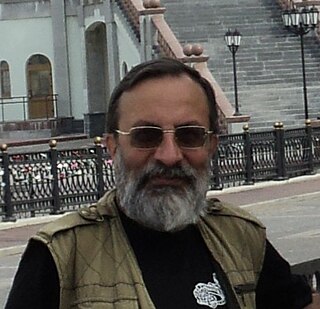
The Russian Academy of Sciences consists of the national academy of Russia; a network of scientific research institutes from across the Russian Federation; and additional scientific and social units such as libraries, publishing units, and hospitals.

Otto Yulyevich Schmidt was a Soviet scientist, mathematician, astronomer, geophysicist, statesman, academician, Hero of the USSR, and member of the Communist Party.

Mikhail Nikolayevich Pokrovsky was a Russian Marxist historian. One of the earliest professionally trained historians to join the Russian revolutionary movement, Pokrovsky is regarded as the most influential Soviet historian of the 1920s.

Vyacheslav Vsevolodovich Ivanov was a prominent Soviet/Russian philologist, semiotician and Indo-Europeanist probably best known for his glottalic theory of Indo-European consonantism and for placing the Indo-European urheimat in the area of the Armenian Highlands and Lake Urmia.
Daniel C. Waugh is a historian based at the University of Washington. He did his undergraduate work at Yale University, and in 1963 graduated with a B.A. in Physics. In 1965, he finished his Master's on the Regional Studies of the Soviet Union at Harvard University, and seven years later he completed his Ph.D. at the same institution. The same year, 1972, he began his employment at the University of Washington, and has remained there ever since. He taught in three different departments, namely the departments of History, of International Studies, and of Slavic and East European Languages and Literature until 2006. His main academic interests are Central Asia and medieval and early modern Russia, although he once focused on Ottoman history. He is the current director of the Seattle Silk Road Project and editor of the journal of the Silkroad Foundation.

Archi is a Northeast Caucasian language spoken by the Archis in the village of Archib, southern Dagestan, Russia, and the six surrounding smaller villages.
Publishing houses in the Soviet Union, were a series of publishing enterprises which existed in the Soviet Union.
Sergey Pavlovich Kurdyumov was a specialist in mathematical physics, mathematical modeling, plasma physics, complexity studies and synergetics from Moscow, Russia.

Joseph Orbeli was a Soviet-Armenian orientalist and academician, who specialized in medieval history of Southern Caucasus and administered the State Hermitage Museum in Leningrad from 1934 to 1951. Of Armenian descent, he was the founder and first president of the Armenian Academy of Sciences (1943–47).

Khinalug is a Northeast Caucasian language spoken by about 1,500 people in the villages of Khinalug and Gülüstan, Quba in the mountains of Quba Rayon, northern Azerbaijan. It forms its own independent branch within the Northeast Caucasian language family.
Alexei Petrovich Tsvetkov is a Russian poet and essayist.
Galina Gavrilovna Yershova, or Ershova is a prominent Russian academic historian, linguist, and epigrapher, who specialises in the study of the ancient civilisations, cultures, and languages of the New World. As an Americanist scholar, her area of expertise is in the field of Mesoamerican studies, and in particular that of the pre-Columbian Maya civilisation, its historical literature, and its writing system. Yershova is a former student and protégé of the famed Russian linguist and epigrapher Yuri Knorozov, renowned for his central contributions towards the decipherment of the Maya script.
Giuseppe D’Amato is an Italian historian, specializing in Russia and the former USSR, and a columnist of international politics.

Viacheslav Petrovich Volgin was a Russian historian who wrote a number of books on early forms or precursors of communism, and who became vice-president of the Russian Academy of Sciences.

Vladimir Kolupaev is a historian, Doctor of Historical Sciences, a graduate of the Moscow State University of Culture and Arts and Catholic priest.

Vladimir Petrukhin is a Russian historian, archaeologist and ethnographer, Doctor of Historical Sciences, professor of History and Archives Institute of the Russian State University for the Humanities, chief research fellow of the Medieval Section of the Institute of Slavic Studies of the Russian Academy of Sciences.
Boris Zinoviyevich Falikov, born September 24, 1947 in Holmsk, Sakhalin region, Russian Federation - is a Soviet and Russian historian and publicist, specializing in the field of new religions, has a Ph.D. in history sciences, assistant professor at “Centre of Religion Studies" with Russian State University for the Humanities. He is the younger brother of the poet and writer Falikov, Illya Zenoviyevich.
Peter Yulievich Schmidt was a Russian and Soviet zoologist, ichthyologist and museum curator.












